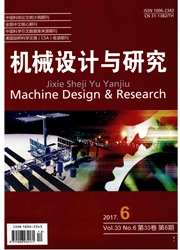

 中文摘要:
中文摘要:
合理的分配装配体中各零件的公差是保证产品性能和降低企业开销的基本方法之一。目前的公差优化分配以尺寸公差为主,较少涉及形位公差,且假设零件为刚体,忽略了实际工况对装配性能的影响。为解决上述问题,以修正的雅可比旋量模型为基础,同时考虑旋量参数之间的约束关系,并结合公差成本函数,建立了实际工况下装配公差优化分配模型。最后,利用遗传算法(GA)对机床尾座进行公差优化分配,对理想情况和实际工况下的分配结果比较分析,结果表明所提方法适用范围广更符合工程实际。
 英文摘要:
英文摘要:
The appropriate allocation of tolerances among the different parts of an assembly is one of the fundamental methods to ensure product performance and reduce the enterprise cost. Present optimal assembly tolerance allocation is usually dimensional tolerance based,less involves geometric tolerance,and assume that parts are rigid body. The influence of assembly performance caused by actual working condition is neglected. To solve these problems,the constraints between the screw parameters were considered on the basis of revised Jacobian-Torsor model.The optimal tolerance allocation model in actual working condition was established combined with tolerance-cost function. Finally,the Genetic Algorithm( GA) was used to tolerance optimization allocation for a machine tailstock.The allocation results of ideal and actual working conditions were analyzed. The result shows that the proposed method is extensive application scope,and more adaptive to the actual project.
 同期刊论文项目
同期刊论文项目
 同项目期刊论文
同项目期刊论文
 期刊信息
期刊信息
